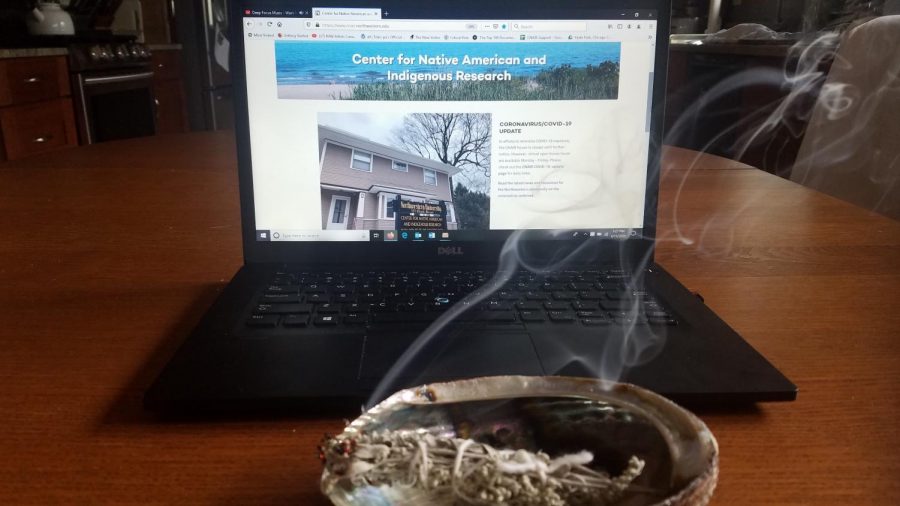Center for Native American and Indigenous Research connects through virtual open houses
photo courtesy Jennifer Michals
Sage in a bundle burns for a smudging ceremony. CNAIR’s program assistant Jennifer Michals has been smudging at their virtual community open houses.
May 17, 2020
As the Center for Native American and Indigenous Research grapples with the loss of in-person community meetings, Northwestern’s Native American community has found ways to virtually connect and support each other during the coronavirus outbreak.
“It’s challenging because we’re such a small community and our relationships are very close and personal,” CNAIR director Patty Loew said. “Trying to maintain social distancing, you know, that doesn’t really work for us. We’re okay with physical distancing, but it’s really important for us to keep socially connected.”
In order to do that, Pamala Silas, CNAIR’s associate director of community outreach and engagement, has been hosting “virtual community open houses.” She has hosted them for one hour in the afternoon, every weekday over Zoom, since campus closed.
Silas said the virtual meetings hold no specific agenda, with conversation ranging from sharing personal stories to brainstorming ways to continue decolonizing education.
“Since the governor put forth the stay at home order, immediately, we felt the urgency and importance to make sure our community, our students, our affiliates knew that we still wanted to create community,” said Jennifer Michals, CNAIR’s program assistant.
These virtual meetings fill the void of the in-person meetings that would have taken place at CNAIR’s new house on campus, which the research center has occupied since January.
Michals refers to the CNAIR house as a “home.” She described a building infused with the smell of burnt sage from smudging — a purification ritual which consists of burning a mixture of sacred herbs and sage before an event or gathering.
“When some of us are struggling, Jennifer (Michals) brings out her smudge pot and it’s just a way for us to connect in a really beautiful way,” Loew said.
Because the smudging is culturally important and helps when people are in tough times, Michals has been bringing her smudge pot to the virtual open houses.
Michals noted that “once you smell sage it imprints in your brain,” and even the visual of the smudging is enough to conjure memories of CNAIR’s house on campus.
“You’re able to see the smoke rise, so I just think it created a really good visual to stay connected to our values and beliefs and spirituality and each other at this time,” Michals said.
Michals said it’s also important for CNAIR to encourage their graduate students to continue their dissertations, emphasizing the importance of the work they are doing despite many students’ overwhelmed feelings.
In addition to staying connected virtually, Silas said CNAIR has helped students find success in their research. She highlighted three students whose work is related to Native American issues, who have recently gotten jobs or received grants with support from the center.
Weinberg senior Lois Biggs recently received a Fulbright-University of Leeds Award for her research. PhD candidate Bonnie Etherington plans to begin a post-doctoral fellowship in environmental humanities at the University of Colorado, Boulder in the upcoming year. Additionally, PhD candidate Alissa Baker-Oglesbee will serve as an assistant professor at Northeastern State University for the 2020-21 academic year.
“In the midst of all this, our students are moving to the next chapter and are being offered some amazing resources,” Silas said.
Correction: A previous version of this story incorrectly stated that Bonnie Etherington was Indigenous. The Daily regrets this error.
Email: emmayarger2023@u.northwestern.edu
Twitter: @emmayarger



